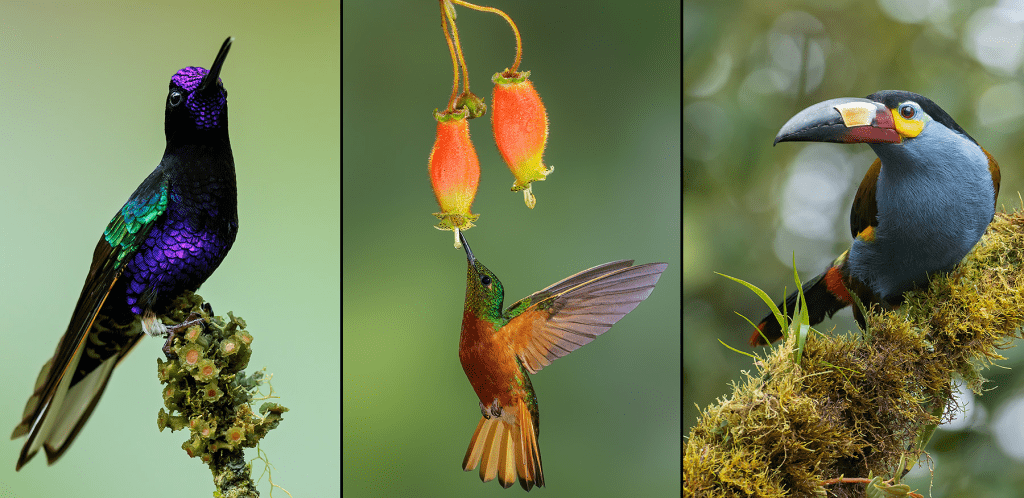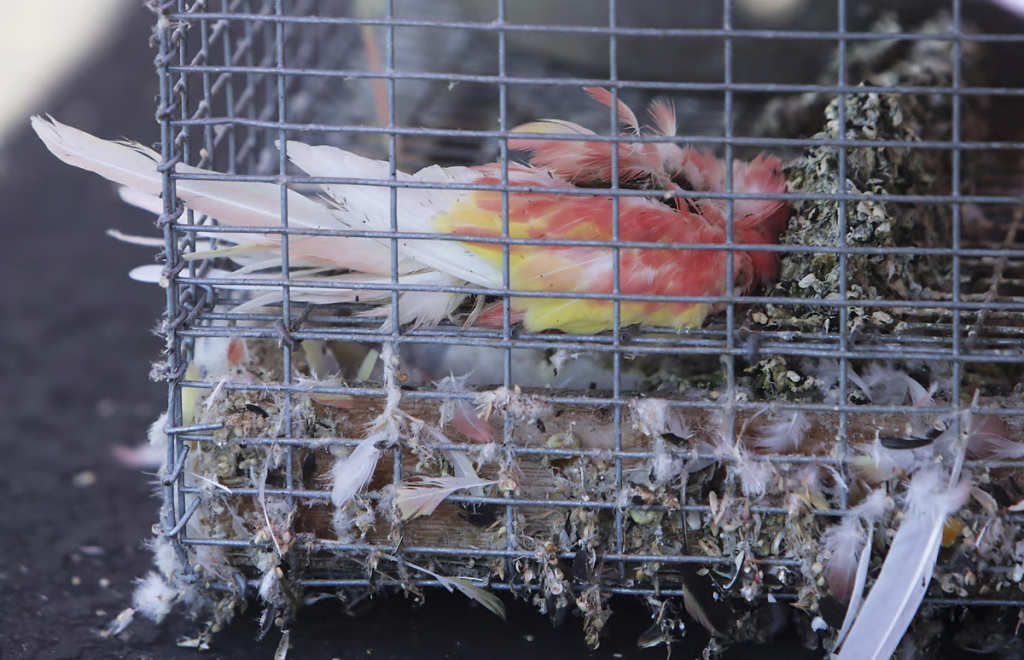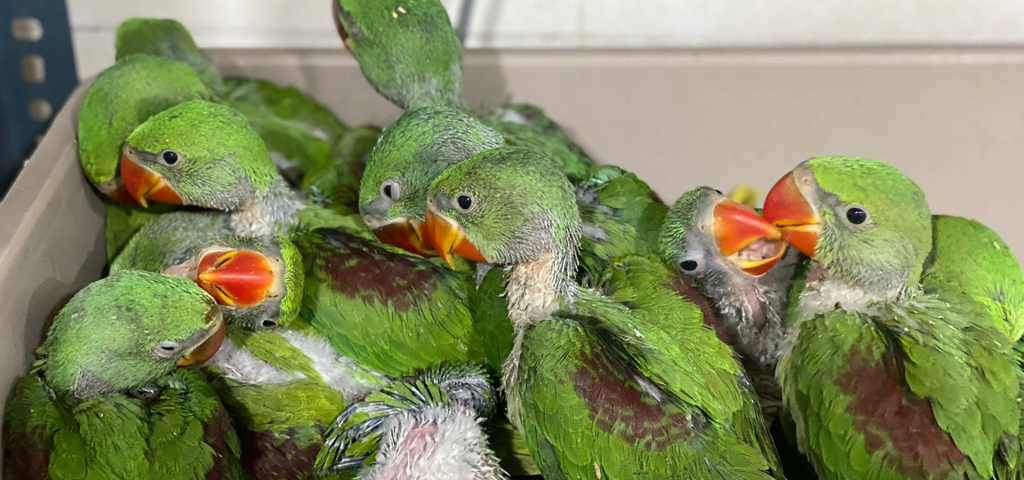پرندے دلکش مخلوق ہیں جو اپنے متحرک رنگوں، پیچیدہ گانوں اور چنچل فطرت کے لیے مشہور ہیں۔ صدیوں سے، انسانوں نے ان کی تعریف کی ہے، اکثر انہیں پنجروں میں پالتو جانور کے طور پر رکھتے ہیں۔ تاہم، پرندوں کو پنجروں میں رکھنا ان کی صحت کے لیے نقصان دہ سمجھا جاتا ہے، جس سے جسمانی اور نفسیاتی پریشانی ہوتی ہے۔ یہ مضمون اس بات پر غور کرتا ہے کہ پرندوں کو پنجروں میں رکھنا ان کی صحت اور خوشی کے لیے کیوں نقصان دہ ہے، اور ان کے فطری طرز عمل، سماجی تعاملات، اور دماغی صحت پر قید کے گہرے اثرات کو دریافت کرتا ہے۔
پرندوں کی قدرتی زندگی: آزادی اور سماجی بندھن کی دنیا
جنگلی میں، پرندے گہری سماجی مخلوق ہیں، جو اپنے قدرتی ماحول کے تانے بانے میں پیچیدہ طریقے سے بنے ہوئے ہیں۔ وہ تنہا مخلوق نہیں ہیں بلکہ متحرک، باہم جڑی ہوئی کمیونٹیز میں پروان چڑھتے ہیں جو انہیں جذباتی اور جسمانی مدد فراہم کرتے ہیں۔ تنہا وجود کے برعکس بہت سے پنجرے میں بند پرندوں کا سامنا کرنا پڑتا ہے، ان کے جنگلی ہم منصب اپنے ریوڑ کے ساتھیوں کے ساتھ مضبوط، تاحیات بندھن بناتے ہیں، ایسے تعلقات کا جال بناتے ہیں جو ان کی بقا اور فلاح کو یقینی بناتے ہیں۔

سماجی بندھن اور پیچیدہ تعلقات
جنگلی پرندوں کا سب سے نمایاں پہلو ان کی سماجی نوعیت ہے۔ وہ تنہا نہیں ہیں، بلکہ صحبت، تحفظ اور تعاون کے لیے ایک دوسرے پر انحصار کرتے ہیں۔ جنگلی میں، پرندے قریبی خاندانی اکائیاں بناتے ہیں اور اکثر زندگی بھر اپنے ریوڑ کے ساتھیوں کے ساتھ رہتے ہیں۔ مثال کے طور پر، طوطوں کی بہت سی اقسام، جیسا کہ مکاؤ، پیچیدہ صحبت کی رسومات میں مشغول ہوتے ہیں اور زندگی کے لیے اپنے ساتھی کا انتخاب کرتے ہیں۔ یہ پرندے والدین کی ذمہ داریاں بانٹتے ہیں، دونوں ساتھی باری باری انڈے لگاتے ہیں اور اپنے بچوں کو کھلاتے ہیں۔ یہ تعاون پر مبنی والدین کا انداز ان کی اولاد کی بقا کے لیے ضروری ہے اور ان کے سماجی ڈھانچے کا ایک اہم پہلو ہے۔
ریوڑ کی حرکیات بھی ان کی بقا کی حکمت عملی کا ایک اہم حصہ ہیں۔ جنگل میں پرندے ایک دوسرے کے ساتھ مسلسل بات چیت کرتے رہتے ہیں، چاہے وہ آواز کے ذریعے ہو یا جسمانی زبان کے ذریعے۔ وہ ایک دوسرے پر انحصار کرتے ہیں تاکہ گروپ کو ممکنہ خطرات، جیسے شکاری، اور خوراک کے ذرائع تلاش کرنے میں مدد کریں۔ ریوڑ کا حصہ ہونے کی وجہ سے فراہم کردہ حفاظت اور تحفظ پرندوں کو ایک مشکل اور اکثر غیر متوقع ماحول میں پھلنے پھولنے کی اجازت دیتا ہے۔
سماجی تعامل میں مواصلات اور کھیل کا کردار
پرندے اپنے ریوڑ سے رابطہ برقرار رکھنے اور اپنی ضروریات کا اظہار کرنے کے لیے مختلف قسم کی آوازیں اور اشاروں کا استعمال کرتے ہوئے بہت زیادہ بات چیت کرتے ہیں۔ سونگ برڈز کے مدھر گانوں سے لے کر طوطوں کی آوازوں تک، پرندوں نے مواصلات کا ایک جدید ترین نظام تیار کیا ہے جو انہیں خوراک کے ذرائع، علاقے اور ممکنہ خطرات کے بارے میں معلومات پہنچانے کی اجازت دیتا ہے۔ یہ مواصلات ان کے سماجی رویے کا ایک لازمی جزو ہے، اور یہ ریوڑ کی ہم آہنگی میں اہم کردار ادا کرتا ہے۔
مواصلات کے علاوہ، کھیل پرندوں کی سماجی زندگی کا ایک اہم حصہ ہے. جنگلی پرندے ایک دوسرے کے ساتھ بانڈ کرنے کے لیے کھیل میں مشغول ہوتے ہیں، بقا کی مہارتوں کی مشق کرتے ہیں، اور گروپ کے اندر اپنے تعلقات کو مضبوط کرتے ہیں۔ کھیل میں درختوں کے ذریعے ایک دوسرے کا پیچھا کرنا، اشیاء کا تبادلہ کرنا، یا مطابقت پذیر سرگرمیوں میں حصہ لینا شامل ہو سکتا ہے، جیسے کہ تشکیل میں اڑنا۔ یہ چنچل تعاملات صرف تفریح کے لیے نہیں ہیں - یہ پرندے کی جسمانی اور جذباتی نشوونما کا ایک لازمی حصہ ہیں۔

تلاش اور نقل و حرکت کے لیے جگہ کی اہمیت
پرندے قدرتی طور پر متحرک مخلوق ہیں جنہیں پھلنے پھولنے کے لیے کافی جگہ کی ضرورت ہوتی ہے۔ ان کے پروں کو پرواز کے لیے ڈیزائن کیا گیا ہے، اور ان کی پوری جسمانی ساخت حرکت کے لیے موزوں ہے۔ جنگلی میں، پرندے ہر روز میلوں تک اڑ سکتے ہیں، خوراک کے لیے چارہ لگا سکتے ہیں، شکاریوں سے بچ سکتے ہیں، اور اپنے ماحول کی تلاش کر سکتے ہیں۔ یہ حرکت صرف جسمانی ورزش کے بارے میں نہیں ہے۔ یہ ان کی ذہنی صحت کے لیے اہم ہے۔ اڑنے کی آزادی پرندوں کو اپنے آپ کو اظہار کرنے، تناؤ کو دور کرنے اور اپنے اردگرد کے ماحول کے ساتھ بامعنی انداز میں مشغول ہونے کی اجازت دیتی ہے۔
جنگل میں پرندے اپنی جسمانی اور نفسیاتی ضروریات کو پورا کرنے کے لیے اپنے ماحول کا استعمال کرتے ہیں۔ وہ خوراک کے لیے چارہ لگاتے ہیں، گھونسلے کی جگہیں تلاش کرتے ہیں، اور اپنے ریوڑ کے ساتھیوں کے ساتھ سماجی تعامل تلاش کرتے ہیں۔ قدرتی ماحول انہیں اڑنے، اپنے پروں کو پھیلانے اور ایسے رویوں میں مشغول ہونے کا موقع فراہم کرتا ہے جو ان کی صحت اور خوشی کے لیے ضروری ہیں۔ درخت، کھلے آسمان، اور متنوع مناظر تجربات کی ایک نہ ختم ہونے والی صف پیش کرتے ہیں جو پرندوں کو محرک اور اپنے اردگرد کی دنیا کے ساتھ مشغول رکھتے ہیں۔
پرندوں کا باہمی انحصار اور ان کا ماحولیاتی نظام
پرندے ماحولیاتی نظام کے توازن کو برقرار رکھنے میں اہم کردار ادا کرتے ہیں۔ وہ صرف اپنے ماحول کے غیر فعال باشندے نہیں ہیں - وہ اس ماحولیاتی نظام کی صحت میں فعال طور پر حصہ ڈالتے ہیں جس میں وہ رہتے ہیں۔ مثال کے طور پر، بہت سے پرندے جرگ ہیں، ایک پودے سے دوسرے پودے تک جرگ پھیلاتے ہیں، جو پودوں کو دوبارہ پیدا کرنے میں مدد کرتا ہے۔ دوسرے پرندے بیجوں کو پھیلانے میں اہم کردار ادا کرتے ہیں، نئے علاقوں کو نوآبادیاتی بنانے میں پودوں کی مدد کرتے ہیں۔ پرندے کیڑوں کی آبادی کو کنٹرول کرنے میں بھی مدد کرتے ہیں، کیڑوں کی تعداد کو کنٹرول میں رکھ کر ماحولیاتی نظام کو توازن میں رکھتے ہیں۔
ان ماحولیاتی کرداروں کے علاوہ، پرندے دیگر پرجاتیوں کے ساتھ پیچیدہ طریقوں سے بھی تعامل کرتے ہیں۔ کچھ پرندے، جیسے کہ گدھ اور صفائی کرنے والے، لاشوں کو صاف کرتے ہیں، بیماری کے پھیلاؤ کو روکنے میں مدد کرتے ہیں۔ پرندے دوسرے جانوروں کی خوراک کے طور پر بھی کام کرتے ہیں، جو کہ فوڈ چین میں ایک اہم ربط فراہم کرتے ہیں۔ پرندوں کی آبادی کی صحت کا براہ راست تعلق ماحولیاتی نظام کی مجموعی صحت سے ہے، اور پرندوں کی آبادی میں کسی قسم کی رکاوٹ کے ماحول کے لیے دور رس نتائج ہو سکتے ہیں۔
جسمانی اور دماغی صحت کے لیے قدرتی طرز عمل کی اہمیت
ایک پرندے کی جسمانی صحت اور ذہنی تندرستی اس کے فطری طرز عمل سے گہرا تعلق رکھتی ہے۔ جنگل میں، پرندے مسلسل سرگرمیوں میں مصروف رہتے ہیں جو ان کی صحت کو فروغ دیتے ہیں۔ مثال کے طور پر، اڑنا اور چارہ اُڑانا ان کے عضلات کو مضبوط اور ان کے قلبی نظام کو صحت مند رکھنے میں مدد کرتا ہے۔ پرندے بھی اپنے ماحول میں مسلسل ایڈجسٹ ہوتے رہتے ہیں، چاہے وہ کھانے کے نئے ذرائع تلاش کر کے ہوں یا شکاریوں سے بچ کر ہوں۔ یہ مسلسل حرکت اور موافقت ان کی جسمانی تندرستی کے لیے ضروری ہے۔
ذہنی طور پر، ان کے متحرک ماحول کی طرف سے فراہم کی جانے والی مستقل محرک پرندوں کو چوکنا، مشغول اور متجسس رہنے میں مدد دیتی ہے۔ جنگل میں، پرندے مسلسل سیکھتے اور اپناتے رہتے ہیں، جو ان کے دماغ کو تیز رکھنے میں مدد کرتا ہے۔ اپنے ریوڑ کے ساتھیوں کے ساتھ ان کے پیچیدہ سماجی تعاملات، ان کے ماحول کے چیلنجز کے ساتھ، ان کے دماغ کو فعال اور صحت مند رکھنے میں مدد کرتے ہیں۔
اس کے برعکس، پنجرے کی قید پرندے کی ان قدرتی رویوں میں مشغول ہونے کی صلاحیت کو سختی سے محدود کر دیتی ہے۔ پرندے جن کو پنجروں میں رکھا جاتا ہے وہ اپنے ریوڑ کے ساتھیوں کے ساتھ اڑنے، تلاش کرنے یا ان کے ساتھ اس طرح بات چیت کرنے سے قاصر ہیں جس طرح وہ جنگل میں کرتے ہیں۔ محرک کا یہ فقدان جسمانی اور ذہنی صحت کے مسائل کا باعث بن سکتا ہے، بشمول موٹاپا، مسلز ایٹروفی، ڈپریشن اور بے چینی۔

پرندوں پر قید کا منفی اثر
جب پرندوں کو پنجروں میں رکھا جاتا ہے تو وہ اپنی فطری زندگی کے ان ضروری پہلوؤں سے محروم ہو جاتے ہیں۔ قید انہیں چھوٹی، پابندی والی جگہوں پر مجبور کرتی ہے جو انہیں اپنے فطری طرز عمل میں مشغول ہونے سے روکتی ہے۔ یہاں تک کہ سب سے زیادہ کشادہ پنجرا بھی اس آزادی کی نقل نہیں کر سکتا جو پرندے جنگل میں محسوس کرتے ہیں۔ نتیجے کے طور پر، قید میں رہنے والے پرندے اکثر تناؤ، بوریت اور مایوسی کی علامات ظاہر کرتے ہیں۔

نفسیاتی پریشانی اور سلوک کے مسائل
پنجرے پرندوں کے سب سے عام اثرات میں سے ایک نفسیاتی پریشانی ہے۔ آزادانہ طور پر اڑنے، اپنے ریوڑ کے ساتھ بات چیت کرنے، یا کھانے کے لیے چارہ لینے کی صلاحیت کے بغیر، پرندے فکر مند، مشتعل یا افسردہ ہو سکتے ہیں۔ یہ تکلیف اکثر تباہ کن رویوں سے ظاہر ہوتی ہے، جیسے پنکھوں کو اکھاڑنا، ضرورت سے زیادہ چیخنا، یا یہاں تک کہ خود کو مسخ کرنا۔ بہت سے پرندے اپنے ماحول کی یکجہتی اور قید سے نمٹنے کے طریقے کے طور پر دہرائے جانے والے رویے بھی تیار کرتے ہیں، جیسے پیسنگ یا ہیڈ بوبنگ۔
مزید برآں، قید میں پرندوں کی سماجی ضروریات کو اکثر نظر انداز کیا جاتا ہے۔ پرندوں کی بہت سی اقسام، خاص طور پر طوطے، انتہائی سماجی ہیں اور اپنے ساتھیوں اور خاندانی گروہوں کے ساتھ مضبوط بندھن بناتے ہیں۔ اکیلے رہنے پر، وہ انتہائی تنہائی کا تجربہ کر سکتے ہیں، جو رویے کے مسائل اور زندگی کے معیار میں کمی کا باعث بن سکتے ہیں۔ تنہائی کا جذباتی تناؤ ان کی عمر اور مجموعی صحت کو بھی کم کر سکتا ہے۔
جسمانی صحت کے مسائل
قید پنجرے میں بند پرندوں کے لیے جسمانی صحت کے اہم مسائل کا باعث بھی بنتی ہے۔ پرندوں کو اڑنے اور ورزش کرنے کے لیے جگہ کی ضرورت ہوتی ہے، لیکن پنجرا نقل و حرکت کے لیے محدود جگہ فراہم کرتا ہے۔ نتیجتاً، بہت سے پنجرے میں بند پرندے پٹھوں کی کمزوری، کمزور ہڈیوں اور قلبی صحت کی خرابی پیدا کرتے ہیں۔ مناسب جگہ اور ورزش کی کمی موٹاپے کا باعث بن سکتی ہے، جو دل کی بیماری اور جگر کے مسائل جیسے صحت کے مسائل کو مزید بڑھا دیتی ہے۔
مزید برآں، وہ پرندے جنہیں چھوٹے پنجروں میں رکھا جاتا ہے اکثر خراب ماحولیاتی حالات کا شکار ہوتے ہیں۔ مناسب وینٹیلیشن کی کمی، نقصان دہ کیمیکلز کی نمائش، اور ناکافی روشنی سانس کے مسائل، جلد کے مسائل اور صحت کی دیگر پیچیدگیوں کا باعث بن سکتی ہے۔ بہت سے پنجرے میں بند پرندے بھی غذائی قلت کا شکار ہوتے ہیں، کیونکہ قید میں ان کی خوراک میں اکثر مختلف قسم اور غذائیت کی کمی ہوتی ہے جو انہیں جنگل میں حاصل ہوتی ہے۔

پرندوں کی تجارت کا ظلم
پرندوں کے پنجرے کے نقصان دہ اثرات پرندوں کی تجارت سے اور بھی بدتر ہو جاتے ہیں۔ بہت سے پرندے جنگل میں پکڑے جاتے ہیں اور اسمگل کرکے قید میں لے جاتے ہیں، اس عمل میں انہیں خوفناک حالات کا سامنا کرنا پڑتا ہے۔ پرندوں کو اکثر نقل و حمل کے لیے چھوٹی جگہوں پر بٹھایا جاتا ہے، ان کی فلاح و بہبود کا بہت کم خیال رکھا جاتا ہے۔ انہیں کبھی کبھی زبردستی کھلایا جاتا ہے، ان کے پروں کو کاٹ دیا جاتا ہے، اور ان کی چونچوں کو بند کر دیا جاتا ہے تاکہ انہیں لڑنے سے روکا جا سکے۔ بہت سے پرندے اسمگلنگ کے عمل کے دوران مر جاتے ہیں، اور جو بچ جاتے ہیں وہ اکثر جسمانی اور نفسیاتی طور پر صدمے سے متاثر ہوتے ہیں۔
پرندوں کی غیر قانونی تجارت کے جنگل میں پرندوں کی آبادی کے لیے تباہ کن نتائج ہیں۔ وہ انواع جو پہلے ہی خطرے سے دوچار ہیں، جیسے کہ ہائیسنتھ مکاؤ، غیر قانونی شکار کی وجہ سے اور بھی زیادہ خطرے میں ہیں۔ پرندوں کو ان کے قدرتی رہائش گاہوں سے لے جانے سے نہ صرف انفرادی جانوروں کو خطرہ ہوتا ہے بلکہ ماحولیاتی نظام میں بھی خلل پڑتا ہے اور پوری انواع کی بقا کو خطرہ لاحق ہوتا ہے۔
یہاں تک کہ قید میں پالے جانے والے پرندے بھی عبرتناک زندگی کا سامنا کرتے ہیں۔ اگرچہ وہ جنگل سے پکڑے جانے کے صدمے کا شکار نہیں ہوتے ہیں، لیکن وہ اکثر بھیڑ اور غیر انسانی حالات میں پرورش پاتے ہیں۔ پالتو جانوروں کی تجارت کے لیے پالے جانے والے بہت سے پرندوں کو چھوٹے پنجروں میں رکھا جاتا ہے اور وہ قدرتی طرز عمل پیدا کرنے کے مواقع سے محروم رہتے ہیں۔ ان پرندوں کو اکثر زندگی بھر قید کا سامنا کرنا پڑتا ہے، جو جسمانی اور ذہنی صحت کے مسائل سے دوچار ہوتے ہیں۔

پرندوں کو پالتو جانور کے طور پر رکھنے کی اخلاقیات
پرندوں کو پنجروں میں رکھنے کی اخلاقیات جانوروں کے حقوق کے کارکنوں، جانوروں کے ڈاکٹروں اور جانوروں کے رویے کے ماہرین کے درمیان بڑھتی ہوئی تشویش کا موضوع ہے۔ جب کہ کچھ لوگوں کا خیال ہے کہ پرندے قید میں خوش و خرم زندگی گزار سکتے ہیں، شواہد دوسری صورت میں بتاتے ہیں۔ پرندوں کو اس طرح پالا نہیں جاتا جس طرح کتے یا بلیاں ہیں، اور ان کی ضروریات کہیں زیادہ پیچیدہ ہیں۔ انہیں سماجی تعامل، ذہنی محرک، اور حرکت کرنے اور دریافت کرنے کی آزادی کی ضرورت ہوتی ہے۔ پرندوں کو پنجروں میں رکھ کر، ہم انہیں ان کے فطری حقوق سے محروم کر رہے ہیں اور انہیں تنہائی، بوریت اور مصائب کی زندگیوں میں مبتلا کر رہے ہیں۔
ہم مدد کرنے کے لیے کیا کر سکتے ہیں؟
اگر آپ پرندوں کی بہبود کے بارے میں پرجوش ہیں، تو بہت سے طریقے ہیں جن سے آپ مدد کر سکتے ہیں۔ سب سے اہم اقدامات میں سے ایک جو آپ لے سکتے ہیں وہ ہے پرندوں کو بچانے والی تنظیموں کی مدد کرنا جو بدسلوکی یا نظر انداز کیے گئے پرندوں کو بچانے کے لیے کام کرتی ہیں۔ ان میں سے بہت سی تنظیمیں پالتو جانوروں کی تجارت سے پرندوں کی بحالی اور انہیں محفوظ، قدرتی ماحول فراہم کرنے پر توجہ مرکوز کرتی ہیں جہاں وہ آزادانہ طور پر رہ سکیں۔
مدد کرنے کا ایک اور طریقہ پرندوں کو پنجرے میں رکھنے کے مضر اثرات کے بارے میں بیداری پیدا کرنا ہے۔ پرندوں کو اڑنے اور سماجی بنانے کی آزادی فراہم کرنے کی اہمیت کے بارے میں دوسروں کو تعلیم دینا پالتو پرندوں کی مانگ کو کم کرنے اور ان جانوروں کے ساتھ زیادہ انسانی سلوک کی حوصلہ افزائی کرنے میں مدد کر سکتا ہے۔
اگر آپ کے پاس پہلے سے ہی ایک پالتو پرندہ ہے، تو ان کے معیار زندگی کو بہتر بنانے کے لیے تبدیلیاں کرنے پر غور کریں۔ انہیں ایک بڑا پنجرا یا پنڈلی فراہم کریں، سماجی تعامل کے مواقع فراہم کریں، اور کھلونوں، پرچوں اور تلاش کرنے کے لیے محفوظ مقامات کے ساتھ ایک محرک ماحول بنائیں۔ جتنا زیادہ آپ پرندے کے قدرتی ماحول کی نقل تیار کریں گے، وہ اتنا ہی خوش اور صحت مند ہوگا۔















































